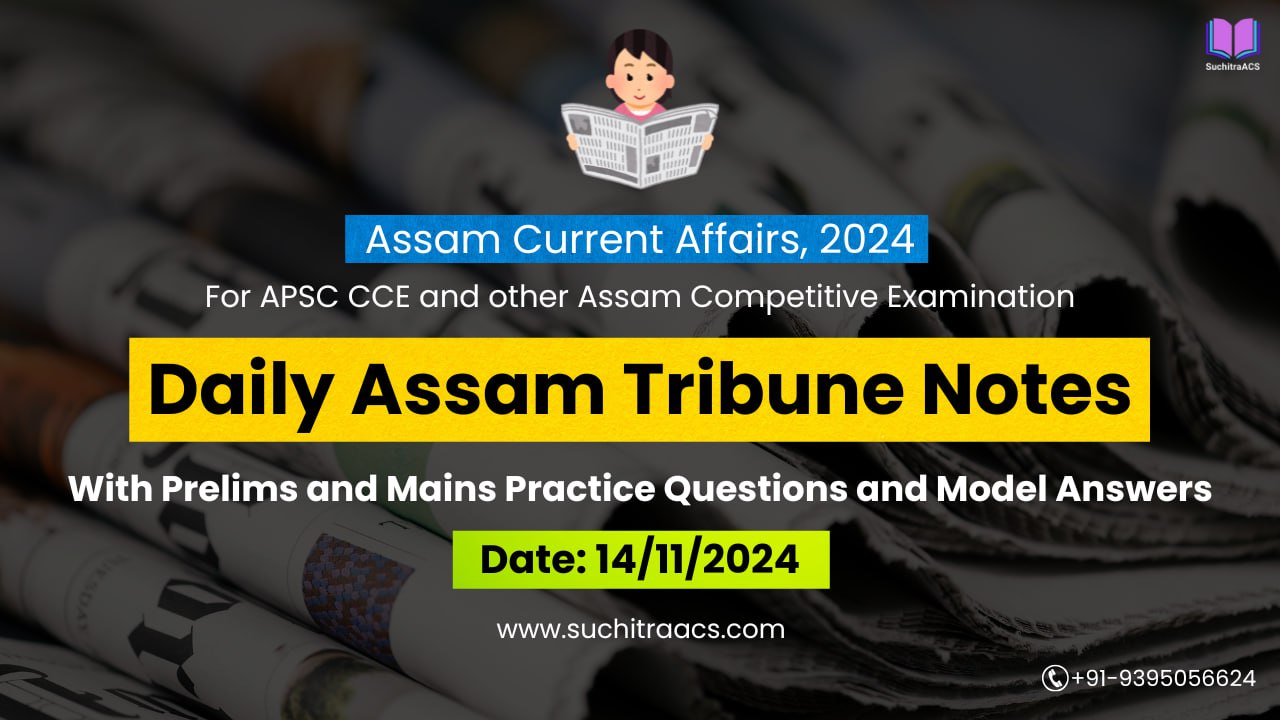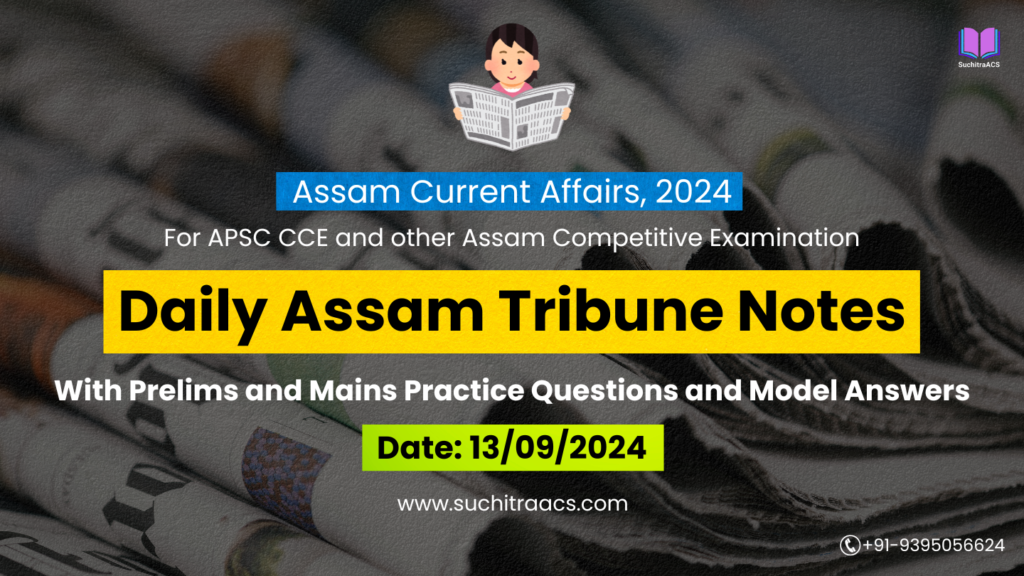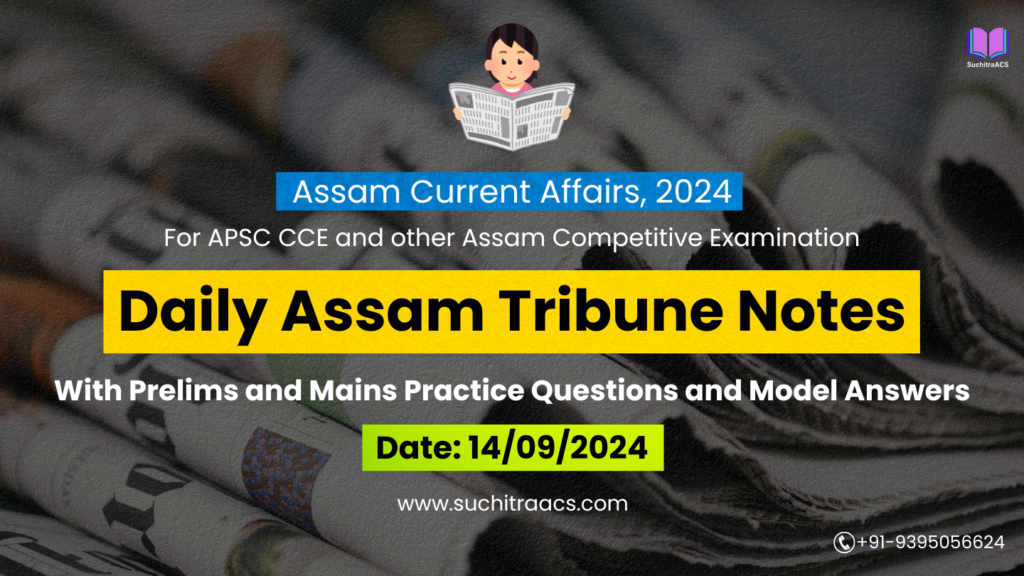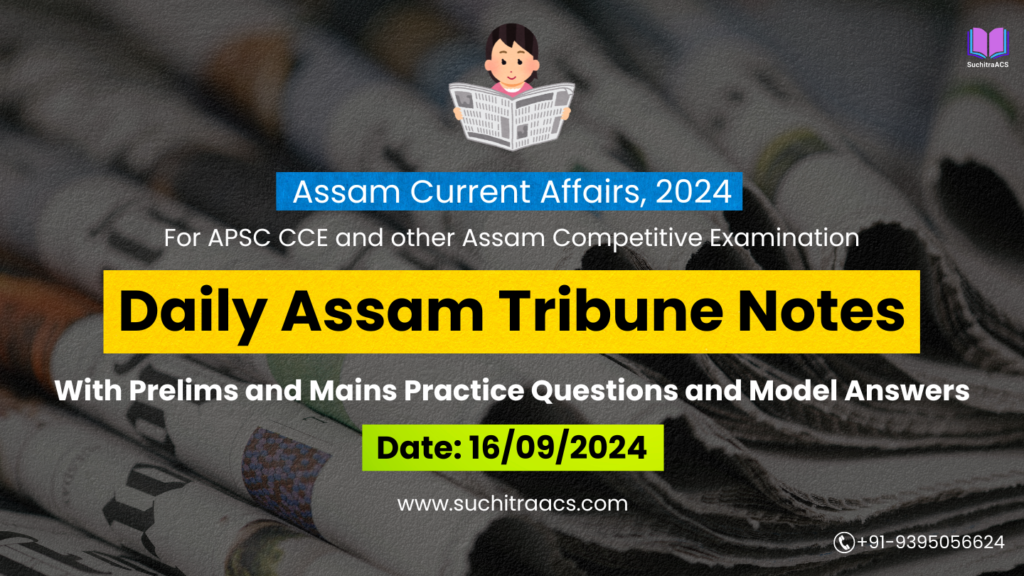APSC Current Affairs: Assam Tribune Notes with MCQs and Answer Writing (14/11/2024)
For APSC CCE and other Assam Competitive examinations aspirants, staying updated with current affairs is vital. This blog covers most important topics from the Assam Tribune today (14-11-2024). These issues are key for both APSC Prelims and Mains preparation, offering insights into the APSC CCE Syllabus.
Topic 1: Brahmaputra Board’s Initiative to Rejuvenate Natural Springs in Northeast
GS Paper 3: Environment and Ecology
Introduction:
The Brahmaputra Board, along with state governments of the Northeast, has initiated a project to rejuvenate natural springs in hilly areas. These springs are essential for local communities, providing potable water and supporting regional biodiversity.
Key Points:
- The Brahmaputra Board’s program aims to revive drying and dried-up springs in collaboration with the Northeast state governments.
- Factors like deforestation, soil erosion, and construction in recharge areas threaten these natural water sources.
- Springs are vital for communities as they supply drinking water and maintain local ecological balance.
Prelims Pointers:
- Brahmaputra Board: A statutory body focused on water resource management in the Brahmaputra and Barak basins.
- Dhara Initiative: A Sikkim program to protect springs, reflecting regional efforts to conserve water sources.
- Spring Rejuvenation: Conservation practice involving the revival of natural springs to enhance water security.
Mains Pointers:
- Importance:
- Water Security: Springs provide a reliable source of drinking water in remote, hilly areas.
- Biodiversity Conservation: Springs support various species, sustaining local ecosystems.
- Cultural Value: Many springs hold religious and cultural significance.
- Climate Resilience: Springs can help communities adapt to climate change by providing consistent water.
- Reduced Groundwater Exploitation: Reduces reliance on deep wells, preserving groundwater levels.
- Challenges:
- Deforestation: Forest loss in recharge areas diminishes water retention capacity.
- Urbanization: Infrastructure development near springs disrupts natural water flow.
- Resource Constraints: Limited funding and technical expertise for widespread spring rejuvenation.
- Community Awareness: Lack of local knowledge on sustainable water use.
- Environmental Degradation: Soil erosion and pollution further threaten spring ecosystems.
- Way Ahead:
- Protect Recharge Zones: Implement strict regulations to prevent construction in spring recharge areas.
- Community Involvement: Engage local communities in spring conservation through awareness programs.
- Technological Interventions: Use GIS mapping and hydrological studies for efficient water conservation.
- Afforestation Initiatives: Promote tree planting to increase soil water retention.
- Policy Support: Establish clear policies on water conservation and spring rejuvenation in the Northeast.
Conclusion:
Rejuvenating natural springs is critical for water security in the Northeast. A coordinated approach with community involvement and scientific methods can help protect these essential water sources, ensuring ecological and human well-being.
Topic 2: Supreme Court Guidelines on Demolition of Properties
GS Paper 2: Governance, Rule of Law
Introduction:
The Supreme Court of India issued guidelines on property demolition, emphasizing the need for due process and upholding citizens’ rights. The ruling mandates a show-cause notice period before any demolition, promoting accountability and safeguarding public interest.
Key Points:
- The guidelines require a 15-day show-cause notice before demolition, allowing citizens to appeal.
- The court highlighted that arbitrary demolitions infringe on constitutional rights and erode public trust.
- The ruling reinforces the principle of separation of powers, ensuring the executive cannot assume judicial functions.
Prelims Pointers:
- Separation of Powers: A fundamental principle of democracy, preventing overlap of judicial, executive, and legislative powers.
- Natural Justice: Legal doctrine ensuring fair treatment in judicial and administrative actions.
- Due Process: The legal requirement that the state must respect all legal rights owed to a person.
Mains Pointers:
- Importance:
- Protection of Rights: Ensures that property rights are not violated arbitrarily.
- Transparency and Accountability: Mandates a clear process, reducing misuse of power.
- Social Stability: Prevents sudden displacements that can lead to economic and social instability.
- Public Confidence: Builds trust in administrative actions and judicial oversight.
- Judicial Oversight: Reinforces the judiciary’s role in protecting citizens’ rights.
- Challenges:
- Delayed Justice: Bureaucratic delays may slow down the process of justice.
- Corruption: Officials may exploit the process, leading to biased enforcement.
- Administrative Hurdles: Coordinating between different departments can complicate compliance.
- Political Influence: Political interests may affect impartiality in enforcing the guidelines.
- Resource Constraints: Lack of resources for legal aid limits access to appeals.
- Way Ahead:
- Strengthen Legal Aid: Provide affordable or free legal assistance to help citizens respond to notices.
- Digital Documentation: Maintain digital records of demolition orders and notices for transparency.
- Independent Review Panels: Establish panels to review demolition cases and prevent misuse.
- Public Awareness Campaigns: Educate citizens about their rights and the guidelines.
- Strict Enforcement of Protocols: Ensure consistent implementation across all states.
Conclusion:
The Supreme Court’s guidelines on property demolition uphold due process, fostering trust in governance. Protecting citizens’ rights through transparent legal frameworks is essential for a democratic society and reinforces the judiciary’s commitment to justice.
Topic 3: ULFA(I) Activity Intensifies in Assam Ahead of Protest Day
GS Paper 3: Security Issues
Introduction:
The United Liberation Front of Asom (Independent), or ULFA(I), has reportedly increased its activities in Assam, leading to heightened security measures. Intelligence inputs suggest potential sabotage acts leading up to the group’s annual Protest Day on November 28.
Key Points:
- Intelligence indicates ULFA(I) cadres have infiltrated Assam, posing threats to public infrastructure.
- Authorities are on high alert, especially along vulnerable border areas, to prevent violent acts.
- Security agencies are working closely with state police to preempt any disruptive incidents.
Prelims Pointers:
- ULFA(I): An insurgent group in Assam, demanding sovereignty from India.
- Protest Day: Observed by ULFA(I) on November 28, marking resistance against perceived injustices.
- Insurgency in Northeast India: Various groups in Assam and the Northeast seek greater autonomy or independence.
Mains Pointers:
- Importance:
- Regional Stability: Ensuring security is critical for peace and progress in Assam.
- Public Safety: Protects citizens from potential violent disruptions.
- Economic Growth: Stability fosters investment and infrastructure development.
- National Security: Prevents border areas from being exploited by insurgent groups.
- Inter-agency Coordination: Demonstrates collaboration between central and state security forces.
- Challenges:
- Cross-border Infiltration: Porous borders make it challenging to track militant movements.
- Local Support: Insurgent groups may find support among certain communities.
- Limited Resources: High security demands strain financial and human resources.
- Geographical Barriers: Dense forests and hilly terrain hinder surveillance efforts.
- Intelligence Gaps: Difficulty in acquiring real-time intelligence hampers preventive measures.
- Way Ahead:
- Enhanced Surveillance: Increase monitoring along borders and known ULFA(I) strongholds.
- Community Engagement: Involve local communities in anti-insurgency efforts.
- Technology in Policing: Use drones and thermal imaging for border surveillance.
- Rehabilitation Programs: Offer incentives for insurgents to surrender and reintegrate.
- Strengthen Border Infrastructure: Construct roads and outposts for better accessibility.
Conclusion:
Addressing ULFA(I) activities requires comprehensive measures combining security, intelligence, and community cooperation. A proactive and preventive approach can help maintain peace in Assam, benefiting regional stability and security.
Topic 4: Union Government Sets Guidelines for Coaching Centre Advertisements
GS Paper 2: Governance and Ethics
Introduction:
The Union Government has introduced new guidelines regulating advertisements by coaching centers to protect students from misleading claims. This move seeks to enhance transparency and accountability in the coaching sector, emphasizing ethical marketing practices.
Key Points:
- Coaching centers are prohibited from making unsubstantiated claims about success rates, job placements, and guaranteed income.
- Institutions must seek written consent before using the names or testimonials of successful candidates.
- Transparency requirements include displaying disclaimers prominently and disclosing all pertinent course information.
Prelims Pointers:
- Consumer Protection Act: Governs consumer rights and prohibits misleading advertisements.
- Transparency in Education: Government efforts to ensure fair practices in education-related advertisements.
- Ethical Advertising: Marketing that adheres to honesty and integrity, crucial in consumer relations.
Mains Pointers:
- Importance:
- Protects Student Interests: Safeguards students from deceptive marketing.
- Ensures Accountability: Holds institutions accountable for false claims.
- Upholds Ethical Standards: Promotes honesty and integrity in education.
- Prevents Financial Exploitation: Protects families from undue financial strain based on false promises.
- Builds Trust: Fosters confidence in legitimate coaching institutions.
- Challenges:
- Enforcement: Ensuring adherence across thousands of coaching centers nationwide.
- Lack of Awareness: Students and parents may not fully understand their rights.
- Resistance from Coaching Centers: Some institutions may resist compliance, citing operational constraints.
- Resource Constraints: Government agencies need adequate resources for effective enforcement.
- Digital Advertising Oversight: Monitoring online advertising requires additional regulatory mechanisms.
- Way Ahead:
- Strengthen Consumer Redressal: Establish quick response channels for grievances against false advertising.
- Public Awareness Campaigns: Educate the public on recognizing and reporting misleading ads.
- Digital Monitoring: Implement AI-driven monitoring for online and social media ads.
- Encourage Self-regulation: Promote self-regulatory bodies within the coaching industry.
- Regular Audits: Conduct periodic checks on coaching centers for compliance.
Conclusion:
The new guidelines offer a crucial step toward a more ethical coaching sector, protecting students’ interests and reinforcing accountability. With robust enforcement and public awareness, these regulations can help create a trustworthy educational ecosystem.
APSC Prelims Practice Questions
Topic 1: Brahmaputra Board’s Initiative to Rejuvenate Natural Springs in Northeast
Question 3: Which of the following practices are part of spring rejuvenation efforts to enhance water security in hilly areas?
- Afforestation around recharge zones
- Controlled infrastructure development in spring catchment areas
- Drilling deep borewells near spring sources
Select the correct answer using the code given below:
A. 1 and 2 only
B. 1 and 3 only
C. 2 and 3 only
D. 1, 2, and 3
Answer: A. 1 and 2 only
Explanation:
- Option 1 is correct. Afforestation helps increase soil water retention in recharge zones.
- Option 2 is correct. Limiting infrastructure near spring catchments reduces disruption to water flow.
- Option 3 is incorrect. Drilling deep borewells near springs can deplete water levels, counteracting rejuvenation efforts.
Thus, the correct answer is A.
Topic 2: Supreme Court Guidelines on Demolition of Properties
Question 4: With reference to the recent Supreme Court guidelines on property demolition, consider the following statements:
- A 15-day show-cause notice is mandatory before any property demolition can take place.
- The guidelines reinforce the principle of separation of powers between the executive and judiciary.
- The guidelines allow for immediate demolition in case of violations related to encroachments.
Which of the statements given above is/are correct?
A. 1 and 2 only
B. 2 and 3 only
C. 1 and 3 only
D. 1, 2, and 3
Answer: A. 1 and 2 only
Explanation:
- Statement 1 is correct. The guidelines require a 15-day notice, allowing property owners an opportunity to respond.
- Statement 2 is correct. This ruling reinforces the principle of separation of powers, ensuring the executive follows due process.
- Statement 3 is incorrect. Immediate demolition is not permitted; due process must be observed, even in cases of encroachment.
Thus, the correct answer is A.
Topic 3: ULFA(I) Activity Intensifies in Assam Ahead of Protest Day
Question 1: With reference to ULFA(I) and its activities, consider the following statements:
- ULFA(I) is an insurgent group in Assam demanding greater autonomy within the Indian Union.
- Protest Day, observed by ULFA(I), is intended to mark their opposition to perceived injustices.
- ULFA(I) is officially supported by neighboring countries, providing it with logistical and financial backing.
Which of the statements given above is/are correct?
A. 1 and 2 only
B. 2 only
C. 1, 2, and 3
D. 2 and 3 only
Answer: B. 2 only
Explanation:
- Statement 1 is incorrect. ULFA(I) demands full sovereignty, not just greater autonomy, and advocates for Assam’s independence from India.
- Statement 2 is correct. ULFA(I) observes “Protest Day” on November 28 to voice resistance against perceived injustices.
- Statement 3 is incorrect. There is no official support for ULFA(I) from any neighboring country, though some groups may receive covert assistance.
Thus, the correct answer is B.
Topic 4: Union Government Sets Guidelines for Coaching Centre Advertisements
Question 2: With reference to the recent guidelines introduced by the Union Government for coaching center advertisements, consider the following statements:
- Coaching centers are prohibited from using testimonials of successful candidates without prior written consent.
- These guidelines require institutions to disclose disclaimers and all relevant course information.
- The guidelines allow coaching centers to guarantee job placements provided they meet a minimum success rate.
Which of the statements given above is/are correct?
A. 1 and 2 only
B. 2 and 3 only
C. 1 only
D. 1, 2, and 3
Answer: A. 1 and 2 only
Explanation:
Statement 3 is incorrect. The guidelines prohibit any claims of guaranteed job placements or success rates, irrespective of performance.
Thus, the correct answer is A.
Statement 1 is correct. Coaching centers are required to obtain written consent before using testimonials from successful candidates.
Statement 2 is correct. The guidelines mandate that institutions prominently display disclaimers and all pertinent course details.
APSC Mains Practice Question
Topic: Ethical Governance in Education – Regulation of Coaching Center Advertisements
Question: Misleading advertisements by coaching centers have often led to financial exploitation and false hopes among students. Discuss the ethical concerns associated with unregulated educational advertising. Suggest measures to ensure transparency and accountability in the coaching sector. (250 words)
Model Answer:
Introduction:
The growing coaching industry in India has increasingly employed aggressive marketing tactics to attract students. Misleading advertisements claiming guaranteed success or exaggerated placement rates exploit students and their families, raising ethical concerns about fairness, honesty, and transparency in educational advertising.
Body:
Ethical Concerns:
- Deception and Misrepresentation: Many coaching centers make unverifiable claims about success rates, misleading students and families into unrealistic expectations.
- Financial Exploitation: High fees based on inflated promises put undue financial strain on families, often resulting in debt.
- Mental Health Implications: Unrealistic expectations contribute to stress, anxiety, and disappointment among students who are unable to meet these advertised promises.
- Disproportionate Competition: Misleading advertising creates a skewed competitive environment, benefiting only larger, financially secure institutions.
- Compromise of Educational Values: A focus on profit over educational integrity erodes trust in the sector and compromises the values associated with learning.
Measures to Ensure Transparency and Accountability:
- Stringent Regulatory Framework: Implement clear regulations mandating disclosure of actual success rates and limiting the use of testimonials without consent.
- Independent Audits: Require coaching centers to undergo audits to verify claims made in advertisements.
- Public Awareness Campaigns: Educate students and families about their rights and encourage them to critically evaluate marketing claims.
- Grievance Redressal Mechanism: Establish accessible channels for reporting misleading advertisements and ensuring swift action.
- Self-Regulation Bodies: Encourage coaching centers to form self-regulatory bodies that promote ethical advertising practices within the sector.
Conclusion:
Ethical advertising is essential in the education sector to protect students’ interests and promote trust. A regulated framework with transparent practices can balance commercial interests with ethical responsibilities, ensuring that education remains a domain of integrity and genuine support for student success.river management is essential for preserving public health, supporting biodiversity, and enhancing the quality of urban life.
✨ APSC Prelims Crash Course, 2025
at most affordable rate in Assam!

🔔 Join Our WhatsApp Study Group!
For exclusive access to premium quality content, including study materials, current affairs, MCQs, and model answers for APSC CCE and other Assam competitive exams.
Click here to join: SuchitraACS Study WhatsApp Group
📚 Want to know more about SuchitraACS’s most affordable courses?
Click here to know more: SuchitraACS Courses for APSC CCE and Assam Competitive Examinations




